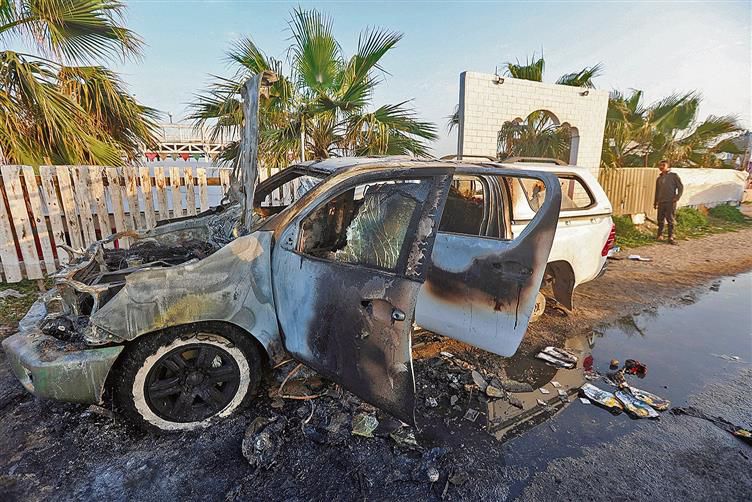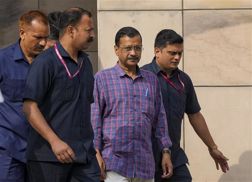
Tragic: Seven volunteers of the World Central Kitchen were killed in an Israeli airstrike last week. Reuters
Distinguished Fellow, Observer Research Foundation, New Delhi
THE founder of the World Central Kitchen (WCK), Jose Andres, has alleged that the Israeli Defence Forces (IDF) systematically targeted the three-car convoy of its personnel, killing seven volunteers last Monday.
PM Netanyahu has repeatedly insisted that he will attack Rafah to root out the remaining Hamas militants.
He pointed out that all three vehicles were clearly marked as WCK vehicles and the Israelis were aware of their itinerary, route and humanitarian mission. The WCK is one of the main institutions that has been delivering food to the people of the devastated enclave.
Confronted with the surge of anger across the world, the Israelis quickly completed an internal investigation and acknowledged on Friday that the strike was a “serious violation of the IDF’s rules and operating procedures”. Israel said it had dismissed two senior officers and three others were reprimanded.
Earlier, the IDF chief of staff, Lt Gen Herzi Halevi, apologised for the strike and described it as “a mistake that followed a misidentification” and that it should not have happened.
Not surprisingly, the Israeli ‘findings’ came a day after US President Joe Biden spoke on the phone to Israeli Prime Minister Benjamin Netanyahu and warned him that if Israel did not change its course in Gaza, “we won’t be able to support you”.
Can one accept the claim that this tragic incident violated the IDF’s operating procedures? The Israeli mea culpa does not mean much because the IDF has a history of strikes on hospitals, ambulances and journalists clearly identified as such. Even now, they have not quite said that the attack was not deliberate.
As the horrendous campaign in Gaza has shown, the IDF has displayed little concern for the humanitarian considerations relating to war. Besides denying food and water to non-combatants, they have used massive unguided bombs to destroy buildings to target Hamas leaders without bothering about the huge collateral destruction and casualties. Their operating procedure seems to suggest that killing a Hamas leader justifies collateral casualties and destruction regardless of their size. We can speculate that they may have assumed, falsely perhaps, that somehow top Hamas leaders were using the WCK convoy as a cover to move around.
The Hamas probably do use civilian cover and have possibly sheltered in hospitals and used ambulances to camouflage their movements. But surely, the IDF needs to be held to a higher standard than the Hamas. It does claim that it operates within international humanitarian law to avoid collateral casualties. Associated with this is the question of proportional counter-force in an insurgency situation. Wiping out an entire block of flats and killing innocent men, women and children to target a Hamas cadre is certainly a grossly disproportionate use of force.
A perspective on Israel’s counter-insurgency tactics comes ironically from renowned Israeli war historian Martin van Creveld. In a 2005 essay, he examined two ways of defeating an insurgency. The first was used by Syrian President Hafez al-Assad to defeat the Muslim Brotherhood that threatened his rule in the early 1980s.
When the ‘traditional’ tactics of arrest, torture and execution did not work, Assad decided to go after the “head of the snake” — the city of Hama. The Syrian army surrounded the city and used heavy artillery to reduce it to ruins, thereby killing around 20,000 civilians, followed by the detention of another 15,000 and the deportation of 100,000. Around two-thirds of the city was demolished and the Muslim Brotherhood movement crushed. The brutality served to deter the Islamist opponents of the Assad family, though in 2011-12 a democratic revolution resulted in an insurgency which has torn the country apart.
Van Creveld contrasts this with the tactics used by the British to successfully overcome the Irish Republican Army (IRA) insurgency in Northern Ireland. The insurgency intensified in the early 1970s as the IRA went on a bombing spree. The accompanying riots and assassinations killed dozens of people. After a particularly bloody Sunday on January 30, 1972, the British revised their tactics. They never again opened fire on marching or rioting crowds, never used heavy weapons like tanks in their operations, let alone airpower. Also, they avoided collective punishment like curfew, blowing up houses or destroying neighbourhoods for military advantage.
He does not say this, but one important factor is the fact that in the first case, the Syrian army was battling the ‘other’ — the Assad regime and most of its army comprises the Alawite minority in Syria, which is barely considered Muslim by its Sunni opponents. The British, on the other hand, see Northern Ireland as very much a part of the UK, even though the IRA was largely Roman Catholic.
This is the problem in Gaza, where many Israelis deny that the Palestinians deserve to be treated as fellow humans. Over the years, they have forcibly taken away their lands, imprisoned a large number of their people and have now systematically destroyed their largest urban conglomeration.
Six months after the Hamas terror attack of October 7, the war is in a state of limbo. Netanyahu has repeatedly insisted that he will attack Rafah to root out the remaining Hamas militants, but the US has termed it a ‘red line’, considering that it houses a million refugees.
When it comes to the current war, Van Creveld’s position is more supportive of the IDF, though he believes that the eventual victor could well be the Hamas, whose task is to simply survive the IDF onslaught. The people of Gaza will have to live long with the consequences of this war and are unlikely to be reconciled to their fate in the long run. Crushing the Hamas militarily most certainly cannot be equated with their political demise.
Incidentally, the Indian military self-consciously avoided using heavy weaponry and attack helicopters even at the height of the Kashmir insurgency.
Join Whatsapp Channel of The Tribune for latest updates.



























